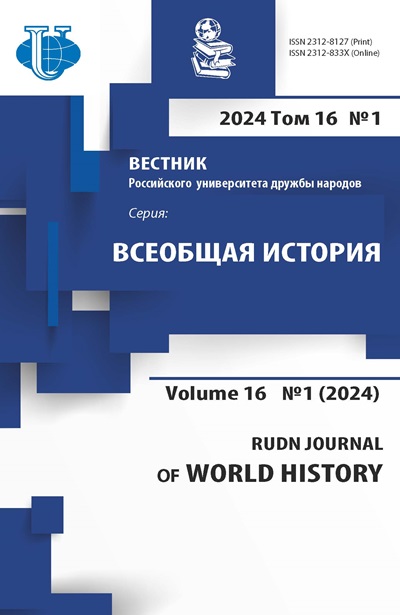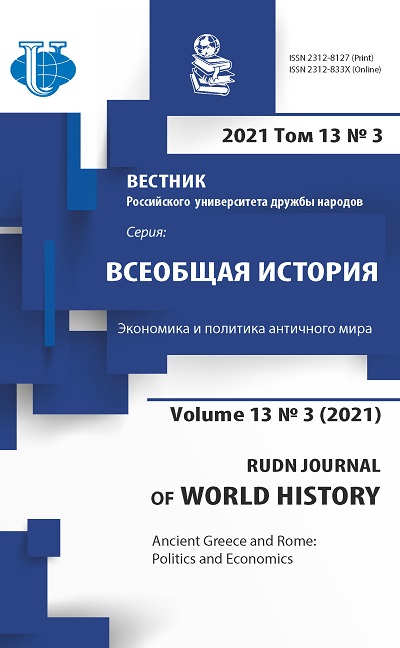Why Cato did not want to feed the sick slaves, or Some observations on the Roman economy of slavery
- Authors: Kvashnin V.A.1
-
Affiliations:
- Vologda State University
- Issue: Vol 13, No 3 (2021): Ancient Greece and Rome: Politics and Economics
- Pages: 286-298
- Section: AGRARIAN STRUCTURE AND ECONOMIC LIFE OF ANCIENT ROME
- URL: https://journals.rudn.ru/world-history/article/view/27323
- DOI: https://doi.org/10.22363/2312-8127-2021-13-3-286-298
Cite item
Full Text
Abstract
The article is devoted to the study of the Second Chapter “Agriculture” of Cato the Elder. The author pays the main attention to the advice of Cato not to give full rations to sick slaves, which became widely known thanks to the biographical work of Plutarch. Not denying the possibility the existence of such a practice, the author attempts to identify its roots, originating in the traditions of traditional medicine, which is reflected in the 126-157 chapters of Cato’s “Agriculture”. In particular, attention is drawn to the author's repeated mention that medication should be taken on an empty stomach, for which Cato consistently uses the Latin term “ieiunus”. In particular, the author draws attention to the fact that Cato often mentions that the intake of medicines should be made on a empty stomach, for which the Roman author often uses the Latin term “ieiunus”. In general, the text of Cato’s work reflects work reflects as archaic beliefs and norms, as well as new concepts and values.
About the authors
Vladimir Aleksandrovitch Kvashnin
Vologda State University
Author for correspondence.
Email: kvashninv195@mail.ru
doctor of sciences (history), professor department of jurisprudence
15, str. Lenina, Vologda, Russian Federation, 160000References
- Vallon А. Istoriya rabstva v antichnom mire. Мoscow.: OGIZ-Gospolitizdat publ., 1941. (In Russ.).
- Sergeenko МЕ. Zhizn drevnego Rima. Мoscow – Leningrad: Nauka publ., 1964. (In Russ.).
- Maroti E. Feria in familia (K ponimaniyu Cato, De agri cultura, 138). Vestnik drevnei istorii. 1970;(2):60–64 (In Russ.).
- Smirin VM. Patriarhalnye predstavleniya i ih rol v obshchestvennom soznanii rimlyan. Kultura drevnego Rima. II. Мoscow: Nauka publ., 1985;5–78. (In Russ.).
- Kuzishchin VI. Evolutsiya italiiskogo zemledeliya i vozrastanie ekspluatatsii rabskogo truda. Vestnik Moscovskogo universiteta. IX (Istoriya). 1966;(5):77–95. (In Russ.).
- Shtaerman ЕМ. Rastsvet rabovladelcheskih otnoshenii v Rimskoi respublike. Мoscow: Nauka publ., 1966. (In Russ.).
- Kuzishchin VI. Antichnoie klassicheskoie rabstvo kak ekonomicheskaya sistema. Мoscow: Мoscow State University publ., 1990. (In Russ.).
- Astin AE. Cato the Censor. Oxford: Clarendon Press, 1978.
- Kienast D. Cato der Zensor: Seine Persönlichkeit und seine Zeit. 3 Aufl. Darmstadt: Wissenschaftliche Buchgesellschaft WBG, 1979.
- Sergeenko МЕ. Iz zametok o Katone. Vestnik drevnei istorii. 1976;(3):154–159. (In Russ.).
- Wiedemann T. Serves senes: The Role of Old Slaves at Rome. Polis. Revista de ideas y formas politicas de la Antigüedad Clásica. 1996;(8):275–293.
- Moss М. Obshchestva, obmen, lichnost. Transl. Мoscow: Vostochnaya literatura publ., 1996. (In Russ.).
- Kvashnin VA. Politika, pravo i religiya v zhizni rimskoi grazhdanskoi obshchini (III–II vv. do n.e.). Vologda: Rus publ., 2006. (In Russ.).
- Oxford Latin Dictionary. Ed. by P.G.W. Glare. Oxford: Clarendon Press, 1968.
- De Vaan M. Etymological Dictionary of Latin and the other Italic Languages. Leiden-Boston: Brill, 2008.
- Bromlei YuV. Sovremennie problemi etnografii (ocherki teorii i istorii). Мoscow: Nauka publ., 1981. (In Russ.).













